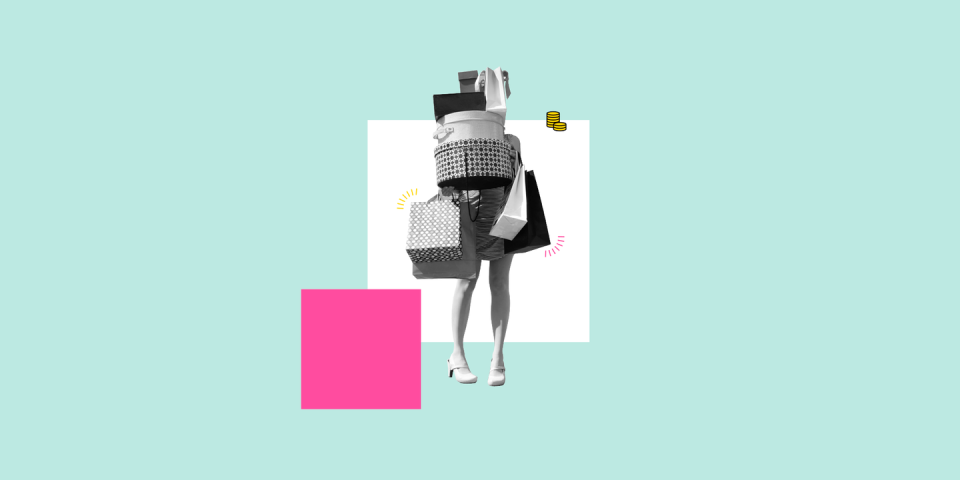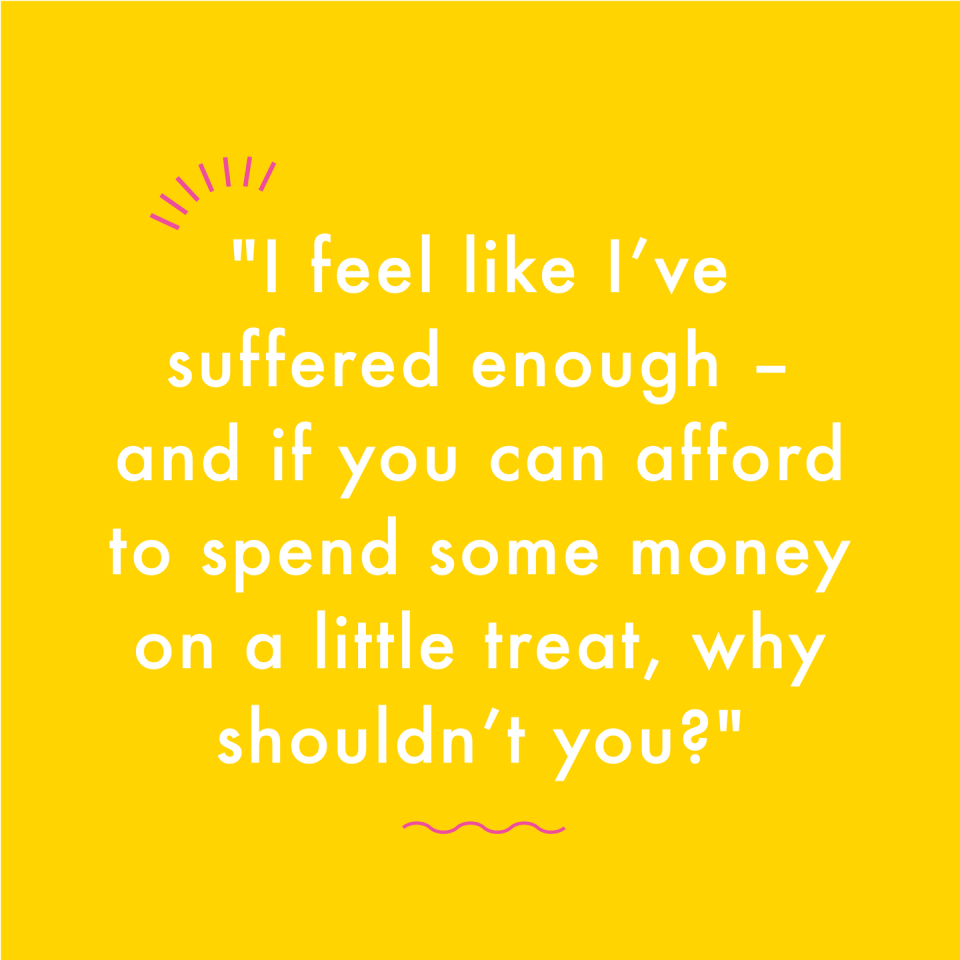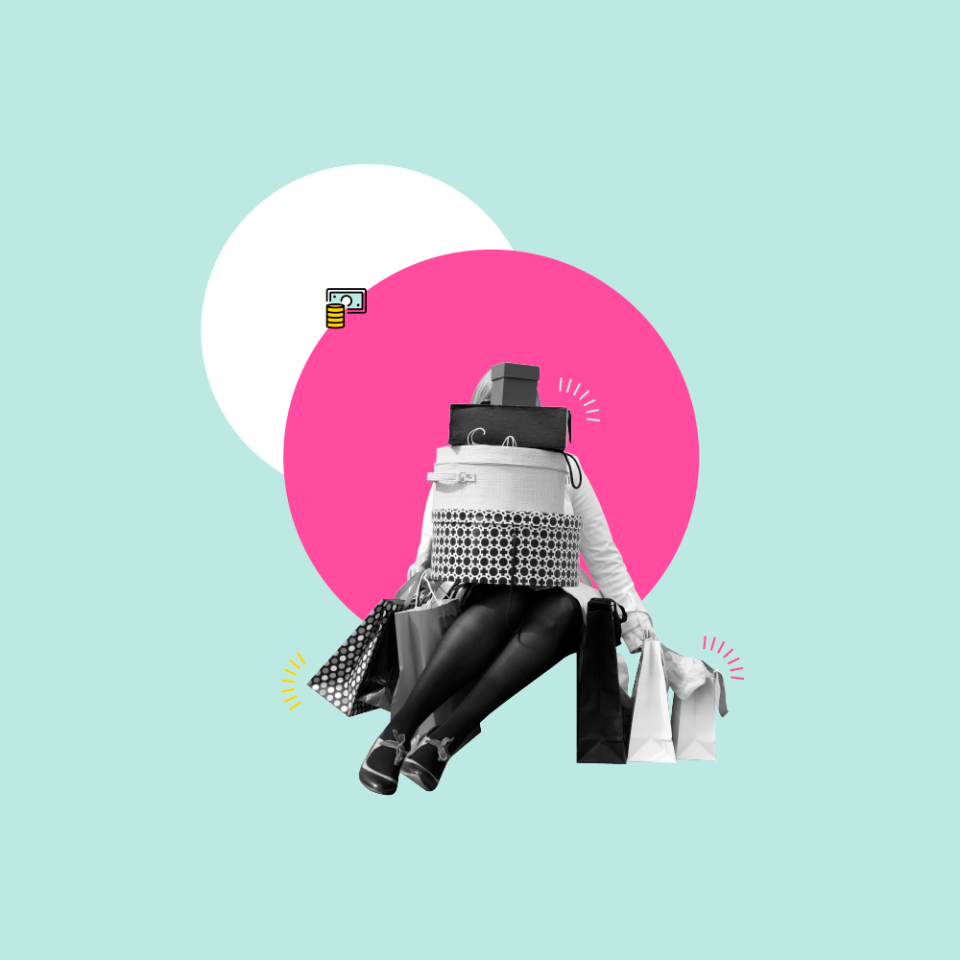The women who can't help but splurge their lockdown savings

It was the colour that first caught Laura’s eye. How could it not? In the bland showroom of black and grey business cars, the letterbox red Audi A3 glistened under the lights. The 29-year-old didn’t even flinch as the salesman asked for just shy of £20,000, and handed over her credit card smiling – fantasising about all the future road trips she and her boyfriend could take in it.
The Audi A3 is just one of many post-lockdown purchases that the marketing firm account director has splurged on in recent months, since the world re-opened its doors. Laura’s other extravagant buys include a Charlotte Tilbury beauty haul so large it’d make a YouTuber blush, tickets to five upcoming festivals, multiple weekends out and perhaps the most life-changing purchase of all: two miniature dachshund puppies, for a tidy sum of £6000.
"I really feel like I deserve to treat myself at the moment," Laura says about her spending. "It’s been a crappy year and a half for everyone."
While there's very few of us who could splash out on the large purchases Laura has, many of us have also seen our spending habits shift – or rather, spiral – as lockdown restrictions end. Post-Freedom Day, plenty have been embracing their former lives with open arms after the rapid spread of COVID-19 put a definite and depressing stop to most everyday activities. No more day trips, no more hungover Sunday roasts, no more... well, anything.
So, is it any surprise then, that thrill-seekers looking to dive headfirst back into hedonism have seen their actions translated into heavy spending? As we attempt to reclaim lost time and turn this decade from pandemic pandemonium into the 'Roaring Twenties' take two.
Financial experts have predicted the UK will spend a total of £50 billion now that restrictions have lifted, and the British Retail Consortium shows a jump in sales by over 50%, with people mostly looking to buy clothes, furniture and book UK staycations as a post-lockdown treat. A study by TopCashback also found the average household now expects to spend an additional £188 a month, with social spending having already surpassed pre-pandemic levels.
While Laura has previously been careful with her money, amassing enough savings to secure a house deposit in 2019, she feels the pandemic and its aftereffects have left her turning to spending to elevate her mood.
"I had long Covid and lost my sense of taste, which I still haven’t got back," she says. "All our Christmas plans were cancelled, as well as holidays. I just feel like I’ve suffered enough – and if you can afford to spend some money on a little treat, why shouldn’t you?"

Cash rich, time poor?
Georgia* agrees. While the 26-year-old hasn’t been splashing out on material goods per se, she has found herself locked into an intense cycle of socialising, and spontaneously heading out to events with friends that were previously meticulously planned.
With two weddings, three festivals, countless dinners, hen parties and nights out having dominated her summer, Georgia was stunned when she realised she'd spent close to £3000 on social activities alone, after examining her Monzo bill.
"I’ve had plans pretty much every night [since July], and things still look busy for the rest of the year," Georgia says. "But I’ve always been someone who is really social, and I don’t feel it’s been a waste of money.
"I'm struggling to turn down plans that I’d usually say no to. Everyone’s saying we’ve missed so much by being locked inside for so long!"
It’s this 'fear of missing out' (or FOMO), that has seen our spending habits spiral, explains Dr Craig Knight, founding director of the University of Exeter’s Identity Realisation Programme (which looks at people’s well-being, satisfaction and productivity when it comes to working and spending).
"The pandemic has certainly changed our restraint and willpower," he says. "There are some people who were lucky enough to make it through the pandemic having amassed significant savings. They weren’t able to go out and do their usual routine while in lockdown, meaning they’ve suddenly got extra money to spend."
He adds that there’s a deeper psychological reason as to why it feels so good to indulge right now too.
"By buying ourselves a 'treat', we’re activating the reward system and the pleasure receptors in our brain. We get a hit of dopamine when spending, and we [then feel we] have to [continually] satisfy that urge," Dr Knight reveals. "This can sometimes lead to knee-jerk spending and splurges as we want to feel more of that pleasure hit."
Both Georgia and Laura point towards their ages when reflecting on why they’ve gone hell for leather with their bank accounts; vital years of their twenties and the experiences that come with it – drunken mistakes, make-ups and break-ups – have been wiped out by the virus.
"I’m nearly 30 and I feel like I’ve lost the last of my twenties to this pandemic," Laura says.
But Dr Knight believes our sudden urge to splurge may be due to another, subconscious factor at play. "We tend to reinforce what we perceive to be our identities with what we buy," he explains, adding that the pandemic has played havoc with how see truly see ourselves.

"Our sense of identity was submerged by the pandemic. We weren’t going out, we weren’t pursuing hobbies. Now these restrictions have eased, we can get back to buying stuff that represents who we are. You might be someone who is seen to like luxury things, so you buy yourself a sports car. You might want to be seen as gregarious, so you throw a massive party.
"People are buying to reinforce the identity of themselves that matters to them, and how they want to be perceived by others."
This is something Alisha, 27, acknowledges to be true, as she believes some of her more recent purchases are linked to how she wants to be perceived by others. While she’s been more careful than Laura and Georgia with her finances, she’s still found herself forking out far more than she ought to, on things she 'doesn't really need'.
After a particularly heavy month, featuring a large unexpected bill, Alisha confesses she probably shouldn’t have spent £300 on new hair extensions – or the additional buttery blonde balayage. But in her mind, it was worth it. She wanted to look good for an upcoming bottomless brunch with the girls – her first big event since lockdown ended.
"Of course, the bottomless brunch led to cocktails, which led to dinner, which led to a night out," the civil servant explains. "I spent nearly £100 more than I was meant to. But I’m a sociable person, I've missed my friends."
Dr Knight is keen to stress that our newly acquired 'treat yo'self' attitude is not necessarily a bad thing either, or even something we even need to curb, urging us to remember we’ve all made it through a hugely traumatic 18 months. "There’s nothing wrong with giving our brains a treat," he says. "We’ve had an absolutely rubbish time. There’s something puritanical about saying, 'Thou shall not splurge'."
But, he cautions, as we spend, we’re also feeding the pleasure receptors in our brain; should we buy something without thinking it through, we could end up leaving our brain’s reward system unsatisfied – and end up dropping even more coins in an attempt to fulfil our mental desires. This, he points out, is when splurging turns problematic.
"Spend wisely. Do something that you really, really want to do, not something that’s a quick-fire reaction," Dr Knight recommends. "Whatever it is we really want, drives the pleasure receptors, and that’s what we’re trying to feed. Get it right, you can satisfy the urge, but get it wrong, you'll only go looking for something else to buy [thus wasting money]."
So, when does splurging get risky?
While Laura has a good job that pays well, she’s noticed in more recent months that she no longer has money left to put into savings.
"I’m spending more money than I’m making," she admits. "I’m at the stage of my life where I need to start thinking about kids and bigger decisions. It makes me think if I end up having to take on a new responsibility, how the hell am I going to afford it?
"I’m not getting a pay rise any time soon and even if I do, it won’t be by much. I know I have to reign it in but it’s just nice to have those pick me ups."
Dr Knight believes people like Laura, who are struggling to stop splurges, are grappling with their 'locus of control' – the degree in which people believe external forces greatly control life’s outcomes.
"If you have an internal locus of control, you believe you are responsible for your actions," he says. "However, when you have an external locus of control, it means you tend to blame external factors on your behaviour. You believe it’s not your fault, it’s the environment around you.
"Having an external locus of control can be troublesome when it comes to spending. You may start to make excuses like: 'It’s not down to me, everyone’s in the same boat and that’s why I’m behaving the way I am'. That’s what makes it difficult to control spending."

However, it should be noted that not everyone has been so gung-ho when it comes to frittering away their earnings. Despite her salon splurge, Alisha feels she’s been careful with her money – particularly as she was made redundant and found herself fighting to keep her flat during the pandemic. Women were also more heavily impacted by job losses than men throughout this difficult time.
"I wouldn’t say I have a 'treat yourself' attitude because I’ve had real money problems over of late," she says. "I’ve enjoyed myself, but I’ve always been mindful of never going too far."
Whether or not our spending sprees in the name of self-care will continue long-term is yet to be seen, but historically, liberal amounts of spending tend to plateau after a certain period of time. Meaning, this repeated credit card-swiping cycle could naturally become a thing of the past before we know it.
"If anything, the pandemic is a cautionary tale," Dr Knight says. "We never know what’s just around the corner."
Dr Knight advises that if you do find your post-pandemic purchases are really starting to spiral, you should start to think about what you’re buying in purely physical terms, and monitor your spending exactly, so you can ascertain just how much you can actually afford.
"If you’re sliding into debt, the best thing to do is to take yourself out the context you’re spending in. Ask yourself whether you’d rather have the cash, or what you’re trying to buy," he says. "The trick is to make your money seem more 'real' by triangulating it. Figure out exactly how much money you have and calculate how much you can reasonably spend. Use cash over contactless, to make it feel more real. That’s the key to curb the splurge."
You Might Also Like

 Yahoo Finance
Yahoo Finance 